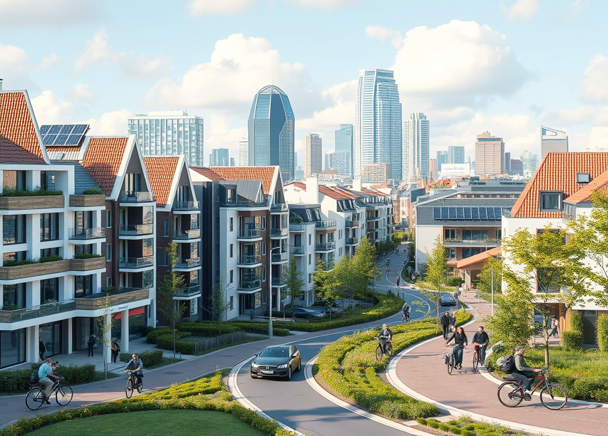The Dutch Real Estate Market in 2026
8550 31.03.2025, 14:33 0 Аналитика
The Dutch real estate market is renowned for its dynamism, influenced by population growth, urbanization, shifting demographics, and government policies. Predicting the future is always a challenge, but by analyzing current trends and anticipating potential disruptions, we can paint a picture of what the Dutch real estate market might look like in 2026.
Key Drivers Shaping the Future:
Several key drivers will play a significant role in shaping the Dutch real estate landscape by 2026:
Continued Urbanization: While already highly urbanized, the Netherlands will likely see continued concentration in major cities like Amsterdam, Rotterdam, The Hague, and Utrecht. This will intensify demand in these areas, impacting property values and availability.
Demographic Shifts: An aging population and decreasing household sizes will continue to influence the type of housing in demand. There will be a growing need for senior-living options and smaller, more efficient apartments.
Sustainability and Energy Efficiency: The Netherlands is committed to achieving ambitious climate goals. Stricter building regulations and increasing consumer demand for sustainable homes will drive investment in energy-efficient renovations and new constructions adhering to high environmental standards.
Technological Advancements: PropTech will continue to revolutionize the real estate industry, impacting everything from property searches and management to construction techniques and financing.
Government Policies: Housing policies, including regulations on rent, zoning, and building codes, will remain a crucial factor shaping the market. Government efforts to address the housing shortage and improve affordability will be closely watched.
Interest Rates and Inflation: The overall economic climate, particularly interest rates and inflation, will significantly impact affordability, mortgage availability, and investment returns in the real estate sector.
Potential Structures of the Market in 2026:
Based on these drivers, here are a few potential structural scenarios for the Dutch real estate market in 2026:
1. The 'Densification and Innovation' Scenario:
Focus: High-density housing development in and around major cities.
Characteristics:
Significant investment in vertical construction and repurposing of existing buildings.
Strong emphasis on sustainable building materials and energy-efficient technologies.
Increased use of modular construction and prefabrication to speed up construction.
Smart Home integration becoming standard in new developments.
Strong growth in co-living spaces and micro-apartments to address affordability in urban centers.
Government support for innovative housing solutions through subsidies and deregulation.
2. The 'Affordable Housing Crisis Mitigation' Scenario:
Focus: Government intervention to address the growing housing shortage and affordability challenges.
Characteristics:
Increased investment in social housing and subsidized rental properties.
Stricter regulations on rental prices and speculation.
Government initiatives to encourage first-time homebuyers through loan guarantees and subsidies.
Development of new, affordable housing options outside major city centers, potentially leading to increased suburbanization.
Focus on repurposing existing buildings for social housing.
3. The 'Regional Disparity and Smart Specialization' Scenario:
Focus: Addressing the uneven distribution of housing and economic opportunities across the Netherlands.
Characteristics:
Government initiatives to attract investment and development to less populated regions.
Development of specialized industrial parks and innovation hubs outside major cities to create jobs and attract residents.
Improved infrastructure connecting regional centers to urban areas.
Tailored housing solutions based on the specific needs of different regions, such as senior-friendly housing in rural areas.
4. The 'Data-Driven and Personalized Real Estate' Scenario:
Focus: Leveraging technology to create a more efficient and personalized real estate experience.
Characteristics:
Widespread adoption of PropTech solutions for property search, management, and valuation.
Data analytics used to identify emerging trends and predict future demand.
Personalized housing solutions based on individual preferences and lifestyle.
AI-powered platforms connecting buyers, sellers, and renters with relevant properties.
Increased use of virtual reality for property viewings and design.
Challenges and Opportunities:
Regardless of the specific scenario that unfolds, the Dutch real estate market in 2026 will face significant challenges:
Housing Shortage: Addressing the persistent housing shortage, especially in major cities, remains a top priority.
Affordability: Maintaining affordability in the face of rising property values and construction costs will be crucial.
Sustainability: Meeting ambitious climate goals through energy-efficient building practices and retrofitting existing properties will be essential.
Infrastructure: Investing in infrastructure to support new developments and connect regional centers to urban areas will be necessary.
However, these challenges also present opportunities:
Innovation: Embracing new technologies and innovative building techniques can help address the housing shortage and improve sustainability.
Sustainable Investment: Investing in energy-efficient properties and sustainable infrastructure can generate long-term economic and environmental benefits.
Regional Development: Encouraging investment and development in less populated regions can create new opportunities and reduce pressure on urban centers.
Conclusion:
The Dutch real estate market in 2026 will likely be shaped by a complex interplay of factors, including urbanization, demographic shifts, technological advancements, and government policies. While predicting the exact structure is impossible, focusing on key drivers and anticipating potential scenarios will enable stakeholders to navigate the challenges and capitalize on the opportunities that lie ahead. By embracing innovation, prioritizing sustainability, and addressing affordability concerns, the Netherlands can ensure a vibrant and resilient real estate market that meets the evolving needs of its population.
Подпишитесь на нашу рассылку и получайте новые статьи прямо на почту
Новости по теме
Комментарии (0)
добавить комментарийДобавить комментарий
показать все комментарииВидео-репортажи
показать ещеReal Estate
- Home
- Projects
- PR Advertising
- Agreement
- Products
- Marketplace
- Contacts
- Manufacturers
- Site Map
- Хостинг от uCoz
© Project Company Holding Marketplace - 2025